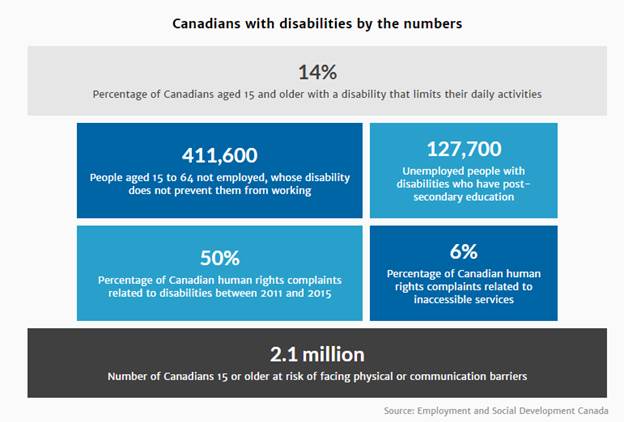
Qualtrough pushes for accessibility despite cost
Federal minister of sport and persons with disabilities wraps up cross-country consultations on proposed accessibility legislation.
TheStar.com
Feb. 9, 2017
Laurie Monsebraaten
Cost can no longer be a barrier to creating an accessible Canada, says Carla Qualtrough, federal minister of sport and persons with disabilities.
“Culturally, it still seems acceptable to say something like: ‘This would be really nice to do, Carla, but it’s going to cost too much money.’ And we need to change that,” said Qualtrough who is crafting the country’s first national accessibility legislation.
“I can’t think of any other marginalized population where that excuse still holds any weight,” she said in Toronto Thursday, where she wrapped up five months of cross-country consultations on the legislation. Online submissions continue until the end of February with legislation to be introduced by the end of the year or early 2018.
Qualtrough hopes the new law will spark a culture shift away from the “fallacy” that making the country fully accessible for more than2.3 million Canadianswith a disability would be financially ruinous.
“You can’t discriminate against people because it costs a bit of money,” the human rights lawyer told the Star. “It’s not okay to say: ‘I’d really like my building to be accessible, but it’s going to cost too much.’ You can’t say that. That’s the culture shift.”
“We need to be thinking about Canadians with disabilities not in terms of how much we cost or how much we need from the system,” added Qualtrough, who is blind. “Canadian society has to start to look at us as economic and civic and social participants. That’s what citizenship is.”
About 1,500 people have attended consultations in 18 communities, including 225 in Toronto on Wednesday. About 100 stakeholder groups have held their own consultations and more than 3,000 online submissions have been received.
Common concerns include the need for Ottawa to take a leadership role in accessibility and for the proposed federal law to have teeth. Qualtrough noted that federally-regulated businesses and industries, such as banks, telecommunications companies and airlines that would be covered by the legislation, are “curious” about enforcement.

Consultation participants want Ottawa and the provinces to work together on accessibility so that, for example, a federally-regulated bank and a provincially-regulated credit union next door don’t have different building code or customer service standards, she said.
Advocates have also called for an independent accessibility commissioner to set accessibility standards and enforce them.
Although she acknowledges the need for a common definition for disability to apply to all federal laws and regulations, the focus of the new legislation will be on “inclusion and breaking down barriers to inclusion . . . in the broadest sense,” she said.
Qualtrough doesn’t expect any push-back from her cabinet colleagues. However, she is concerned how MPs will react if businesses in their ridings balk at the legislation when it is introduced.
“I’m getting a lot of nodding of heads right now. But once people see the meat on these bones, they’re going to want more information,” she predicted.
Culture change will be key to the legislation’s success, she said. “If we don’t do this right we’ll have missed out on an historic opportunity. But at the same time, culture change is long-term.”
